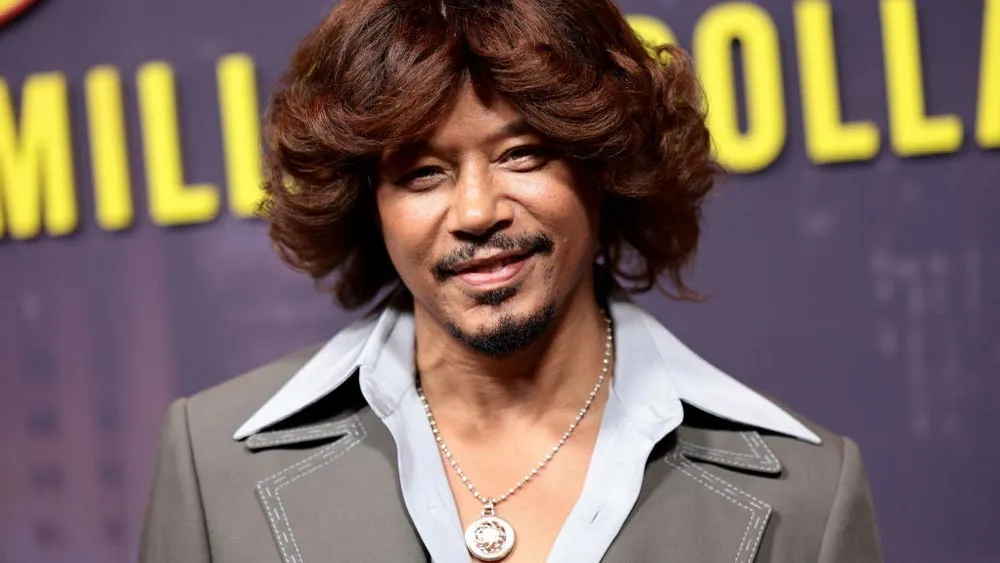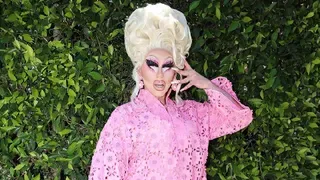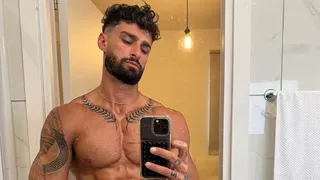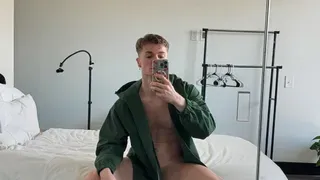October 17, 2012
Lana & Andy Wachowski :: Notoriously private, speak out about 'Cloud Atlas'
Fred Topel READ TIME: 8 MIN.
As they morphed from The Wachowski Brothers to The Wachowski to Wachowski Starship, the filmmaking team Andy and Lana Wachowski (best-known for the "Matrix" trilogy) has been notoriously private. Not that they didn't make headlines: long rumored to be undergoing gender reassignment surgery, Laurence transitioned to Lana this past year, making her first public appearance at the Toronto Film Festival to promote their latest film "Cloud Atlas," co-directed with German director Tom Tykwer from David Mitchell's novel. (Tykwer is best-known as the director of "Run Lola Run" and "Perfume.")
At the appearance Lana explained why now was the time to go public.
"I did feel some responsibility to LGBT people and a lot of people have been asking me to be more public, but we love anonymity," Lana said. "We love our privacy. We don't really think celebrity does much to improve your life. We think it actually worsens your life. So it was a big decision. It took a long time, took a lot of years and this movie. And the fact that we had this new sibling (Tykwer) who loves to do press. (He) can't do enough press, our media whore brother over there (motioning to Tykwer). So we were trying to reconcile how we were going to balance our 'no' press and his 'all' press and we came up with this middle of the road."
Inseperable
The films of the Wachowskis have been diverse. "Bound" was a gangster movie about lesbian lovers who defeat the mob. "The Matrix" trilogy became a landmark of science fiction and Hollywood cinema. "Speed Racer" was a family movie that further pushed visual technology. Andy said he has always been in sync with Lana.
"We just always played together and we were pretty inseparable as kids," Andy said. "I don't know, we never wanted to work apart. We started a painting company when we were trying to pay for college, and then we both dropped out almost simultaneously from our respective schools and we ended up building a construction company. Our mom and dad's house was the last job that we did, and it's still standing."
Weeks later the Wachowskis continued to address their privacy issues in a Los Angeles appearance. "I hope you didn't take it personally that we didn't do press," Lana said. "We didn't mean it as a rejection of this process or a rejection of the people in this process. We feel that anonymity allows you a way to participate in the world, and particularly participate in civic space. Once you lose your anonymity, that door, that access to that way of being is denied to you. And we didn't want to give that up.
A challenging proposition
"We love that aspect of our lives, of our humanity and we didn't want to lose it. In the end, we met this beautiful human being. Just like in the movie, encountering someone can change your life. We encountered him. He does engage in this process. He told us, 'Don't be afraid.' And he engages in it in a very authentic and very, I think, inspiring way, and at the same time, the movie itself is about engagement with the world, that if you want to imagine a better world, the only way to achieve that better world is a process of engagement. And we wanted to maybe help make the world, or at least help participate in the imagining of another world, so here we are, engaged."
"Cloud Atlas" was a challenging proposition. David Mitchell's novel has six stories that take place in different settings, from the historical to the contemporary to the post-apocalyptic. The book tells each of the six stories consecutively, but the film interweaves them, which may have been the key to adapting it.
"The goal of David Mitchell's splicing the six stories together is to make you as a reader start thinking about the ways that the stories are interconnected and they're reflecting and they're resonant and the structures are the same and characters and challenges are the same," Lana said. "So the goal that he had was the same as our goal, that he wanted to dissolve the barriers between these genres and tones and time periods and suggest this larger work, this larger idea, this larger humanity, understanding of humanity. And in the same way, that was our goal with the film. That interweaving way that we did it represents perhaps the way that the book ultimately works on your brain."
Crossing time and genres
Each of the film's actors - Tom Hanks, Halle Berry, Hugo Weaving, Hugh Grant, Jim Broadbent, Jim Sturges, Doona Bae, James D'Arcy, Ben Whishaw and Keith David - play characters in multiple stories. This may encourage you to make connections between characters in different times, or consider it random. The filmmakers made some intentional connections, but the spiritual nature of the film had a power all its own.
"I'm still having breakthroughs and the movie's done," Andy said. "There are still moments in the film that are revealing themselves to me. The last time I saw it, there is this moment when Bill Smoke (Weaving) comes up behind Old Sixsmith (D'Arcy) to assassinate him. The way that he appears behind him, he is out of focus. The way we shot Old Georgie (Weaving), Old Georgie is out of focus as well. There is an organic thing in the DNA of the movie that is constantly reflecting. It's like a hall of mirrors in a way.
"So when you pull apart the book, when you pull apart the fiber of the book and the genetic structure into these molecules and you lay the stories out, you're constantly having breakthroughs because the book is so brilliant in that way. I mean, the structure of the book is a palindrome, right? So the first story is also the last story and the center story is sort of the top of the pyramid. Just the way that David Mitchell wrote it, it's like you can feel how each of these little things connect so constantly you're noticing the similarities in between them."
Unique process
Directing duos are relatively rare in Hollywood, mainly because the Director's Guild has stringent rules about shared credit, hence the complicated credits of the Wachowski's films. Though Tykwer made "Cloud Atlas" a trio, the work was divided in two. The Wachowskis together directed some of the film's storylines, and Tykwer directed the others on separate sets.
"Our filmmaking process is unique because there's the two of us," Andy said. "So a typical dynamic is that there's the director monologue. The crew and the actors can maybe access that monologue. You would expect them to be able to access it 100% of the time but maybe they're not even able to do that. With the two of us, the monologue becomes a dialogue and all of that monologue is externalized. So a crew member can come and they can participate in it because they can hear the reasoning behind a series of decisions.
An act of love
"Ourselves being sort of natural collaborators the way we write and the way we participate, we embrace the social aspect of filmmaking, that it's a social art form. The fact that it's a conscious act that we don't take 'A film by' credit because we're aware that the whole crew is the collective that make the movie. So ideologically, Tom is sort of sympatico with that. The way that he's made his movie with the same people over and over again because he goes into the process in an act of love, so he's extraordinarily collaborative as a director."
Lana added, "The dialogue became a harmony."
The Wachowskis' next film is the sci-fi "Jupiter Ascending," for which they have no details to share at this time. Whether or not they will continue to work in the science fiction genre ("Cloud Atlas" has two segments in the future) or return to the "Bound" mode of storytelling depends on the connections they make in their lives between now and then.
"We sort of take them one at a time because you want to, as you evolve, as you grow, you're looking for material that is reflective of where you are at that point in your life," Lana said.
"Cloud Atlas" opens October 26, 2012.
Watch the trailer to Cloud Atlas:






